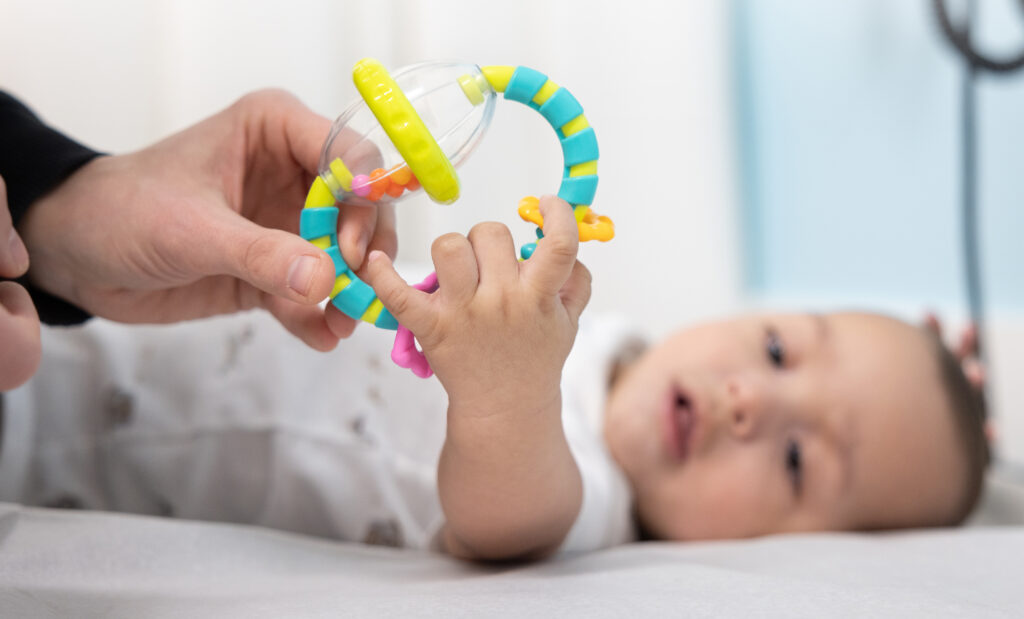As new treatments emerge and diagnostics improve, earlier interventions offer infants with rare metabolic and neurodegenerative conditions a more promising future than ever before.
At Nationwide Children’s Hospital, early identification and bespoke intervention of rare diseases are par for the course. As leaders in rare disease research, accelerating clinical access to genomic testing and developing revolutionary therapeutics, the teams at Nationwide Children’s and the Abigail Wexner Research Institute (AWRI) have a collaborative approach to helping children that is shaping the future of fetal medicine.
“Our infrastructure supports every component of an integrated system of bench-to-bedside research and regulatory support,” says Dennis Durbin, MD, MSCE, president of AWRI. “This institutional support and culture enable our passionate and dedicated teams to work together to tackle diseases with no other treatment options to date.”
Nowhere is the promise of what these teams can do more apparent than in the care for babies with rare genetic disorders.
Early Diagnosis for Better Outcomes
“We’ve reduced the time it takes to get a diagnosis by about 90% or more in the last decade, so much so that we can make a diagnosis on a research basis in just 30 hours if there is a sick baby,” says Bimal Chaudhari, MD, MPH, genetics and genomic medicine specialist in the Steve and Cindy Rasmussen Institute for Genomic Medicine and neonatologist at Nationwide Children’s.
But identifying genetic disorders postnatally is just the first step. Prenatal testing offers the potential to do more.
Although prenatal identification of rare genetic disorders often occurs only among cases where a prior sibling or family member has already undergone a diagnostic odyssey or the mother has elected to undergo prenatal testing, the technology available for early diagnosis is dramatically more advanced — and rapid — than in years past.
Earlier prenatal diagnosis opens a window to intervene before irreversible organ damage has occurred, making the entire cycle of testing and intervention more worthwhile.
For diseases with effective new therapies, extending screening beyond families with a known history of a disease to the broader population via carrier or newborn screening — or the ever-growing range of options for prenatal genetic testing — is the next step.
“We need to improve opportunities for prenatal testing to identify conditions,” says Oluyinka Olutoye, MD, surgeon-in-chief and a world-renowned neonatal and fetal surgeon at Nationwide Children’s. “Now that there is ever-growing potential to intervene medically before a child is born, it expands the utility of prenatal testing. When a diagnosis is made earlier, we can find ways to intervene earlier to improve outcomes.”
Reimagining the Future of Genetic Disease
Better still than early identification with immediate postnatal treatment, would be therapy while a patient is still in utero.
“As great as is to be able to treat the baby, the world really needs to start thinking fetal,” says Dr. Chaudhari. “We need to get better at translating neonatal interventions into fetal interventions.”
While this option is not readily available, it may soon become possible for a wide variety of genetic disorders and other rare conditions.
“The rapid advancements in genomics are affording us increasingly early opportunities for intervention, both postnatally and prenatally.” says Adolfo Etchegaray, MD, chief of fetal medicine at Nationwide Children’s.
“We have that capability, and it’s certainly an advantage being at a place where many of the new gene therapies are actually being developed — we see genetics not only as a way of understanding a diagnosis but as a potential tool to correct that problem.”
Fetal Center at Nationwide Children’s Leading the Way
The Fetal Center team at Nationwide Children’s already intervenes before birth for a whole host of complicated diagnoses, including structural heart anomalies and spina bifida. These prenatal interventions allow the tiny patients life-altering and potentially life-saving changes in their health conditions early, at a developmental stage where the chances of recovery are significantly higher.
“I’m really excited regarding what is to come in maternal-fetal medicine, because this would be like fetal therapy 2.0,” says Dr. Etchegaray. “There’s promise to be able to expand the range of interventions to address thousands of conditions, enabling truly personalized medicine. Instead of treating entire organs, we will target specific genes, proteins, or pathways with tailored precision.”
This ideal is something the broader teams at work at Nationwide Children’s hope to achieve for a growing number of rare diseases and complicated diagnoses.
“The Fetal Center has that template in place to leverage a bigger network of experts focused on taking therapy to the fetus before birth,” Dr. Olutoye says. “The experience, the relationships, the expertise in bringing therapies to market and the synergy of all of us intertwined — we can take that technology and expertise upstream, with the common goal of best outcomes for our patients. The future is bright.”
“Now that there is ever-growing potential to intervene medically before a child is born, it expands the utility of prenatal testing. We can find ways to intervene earlier to improve outcomes.”

